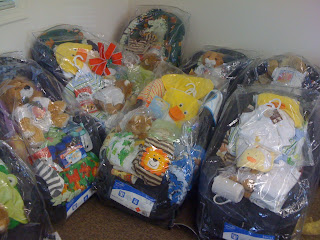The Twilight fans were eager and ready, lining up outside the Arlington Theater hours before the doors were open.
VIP events began at 6:30, with guests being welcomed into a wedding themed reception. There they were able to enjoy yummy drinks and treats and even take a photo with the groom to be- Edward! (Not the real Edward of course, but his cardboard cut out was just as handsome).
Many thanks to our Fundraising Committee who put a lot of hard work into making this event happen, and setting up a fabulous reception.
Pictured below From Left: Ashley Dorris, Meichelle Arntz, Susan McMillan, Marsha Kotyler, Micele White, Messina DeRose, & Sue Bickett.
Flowers graciously donated by Dawn O'Donnell
Pictured Below: Meichelle Arntz, Founder of Angels Foster Care of Santa Barbara, introduces the film
This furry friend even made a special "guest" appearance!








